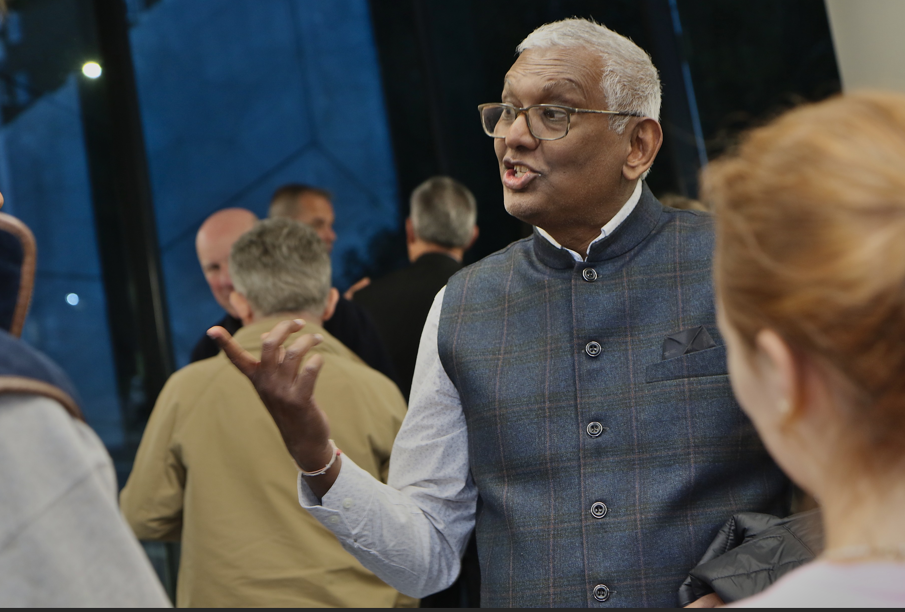
4 minute read
When did finance become culture blind?
So, when did finance become culture blind?
The word community has disappeared from the accounting textbook and professional exams, laments Professor Atul K. Shah.
If you examine any currency note anywhere in the world it says something like, ‘This is a promise to pay the bearer the sum of …. Guaranteed by the Central Bank’. But all accounting equations have turned money into a fact – the promise is forgotten, and trust and mutuality are also irrelevant to both accounting and finance. What does this mean in a world facing big crises of inequality and sustainability?
This is where culture comes in – it is culture, relationships and co-operation that effectively give money and currency its acceptance and reliability. Not a piece of paper, not a number. But we have forgotten this, as we have excluded history from our teaching of accounting. I have taken students on many field trips to the City of London to show them how the stock and insurance markets started in coffee houses, and how there were 104 churches in the square mile before the two world wars.
Religion, belief and trust was central to the emergence of banking, stock markets and financial institutions, but this has now been demolished by a transactional and calculative approach to accounting education. In terms of time, the past 60 years have been extreme in terms of the way economics, finance and accounting education have become culture blind and arrogant, and so abstract that researchers live in their equations and game theories rather than the truth. It is empire disguised as science. Where are 60 years in the history of humanity? Nowhere – as we have been on the planet for at least 30,000 years. And most of the time we lived without money and built peaceful and cooperative communities.
Today, we are soul-less and calculative, becoming greedy, individualist and selfish – the word community has disappeared from the accounting textbook and professional exams. Yet so many of our professionals and students have cultures, beliefs and live in bonded families and communities. There is so much hope for the revival of this spirit in accounting education. This goes to the heart of equality and sustainability, for which many young people are passionate –including accounting students.
I have written a number of books along these lines – ‘Reinventing Accounting and Finance Education for a Caring, Inclusive and Sustainable Planet’; ‘Jainism and Ethical Finance’; ‘Inclusive and Sustainable Finance – Leadership, Ethics and Culture’; and the latest is ‘Organic Finance –Building an Inclusive and Sustainable Framework from the Ground Up’. All of these are published by Routledge, and available globally through Amazon.
In the heart of the City of London, where so much of modern finance was invented, there is an amazing oasis of peace called the ‘Centre for Peace and Reconciliation’ – St. Ethelburgas (www.stethelburgas.org). It is just opposite Liverpool Street station on Bishopsgate and open to the public. It’s well worth a visit, as at the core of it is a Bedouin Tent with picture glass windows from all the world’s cultures. Yes that’s right, in the City of London we have a stunning multicultural space which helps us build trust and relationships through conversations, and open dialogues about ethical accounting & finance and its possibilities. I have spoken there many times.
To counter individualism and materialism we can have pluralism and community, where we come together to help one another, to build social capital and relationships, and to help sustain life on planet earth for all living beings. We can think about how money can be used for social profit, not just private profit. We can help students understand how greed leads to coldness and insecurity – while we may need money to live, we don’t need to be aggressive. We also need to see how billionaires live – on divorce, addiction, insecurity and restlessness, rather than the peace we can find in our cultural families and communities. When we treat our accounting clients with respect, and encourage them to trust us by being honest, they will keep referring us to all their friends and relatives, and we will never be out of work. These are true stories from many accountants I know. And they will also invite you to their family weddings and parties. Which world would you rather choose?
• Professor Atul K. Shah, City-St Georges –University of London. See www.atulkshah.co.uk




